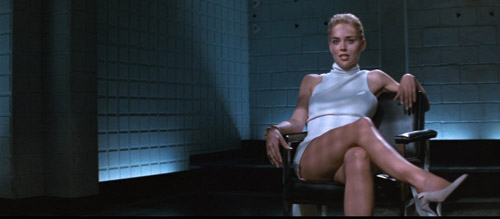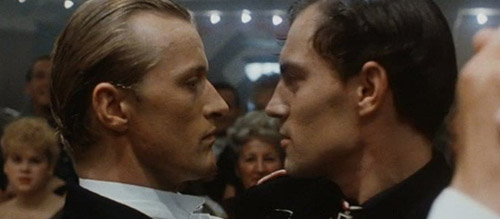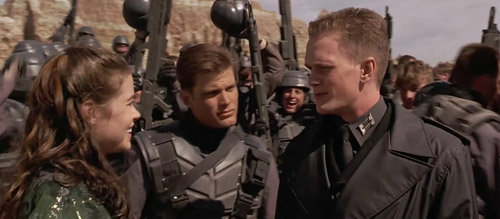Where to Start with Paul Verhoeven
Paul Verhoeven is an often misunderstood and extremely versatile filmmaker. Moving from softcore arthouse European fare to erotic suspense thrillers in Hollywood, and whatever Showgirls was, he has been difficult to pigeonhole beyond his fondness for nudity. There was also a time, in between shocking, captivating and bemusing his audiences, that he decided to give more commercial filmmaking a go, and did so completely in his own unmistakable voice, leaving an indelible mark on the sci-fi film genre.
In his home country of the Netherlands, Verhoeven quickly made the move from directing television to becoming one of Europe’s boldest and most insightful filmmakers, making a string of hard-hitting dramas examining Dutch identity and national history. Turkish Delight was nominated for the Best Foreign Language Film Oscar and, along with Soldier of Orange and Black Book, is seen by many as among the greatest Dutch films of all time.
When Hollywood came a-calling, over a ten year period that spanned the end of the 80s and 90s, Paul Verhoeven changed science fiction filmmaking forever. The maverick Dutch auteur took a struggling B-movie and two adaptations that intentionally changed the message of their source material, and made them all classics of the genre. Despite his success, Verhoeven returned home in the early 2000s to focus on personal projects once more.
Verhoeven employs ultraviolence and hyper-sexualised imagery throughout his work, seemingly equally because he is making a point about the uncomfortable side of human society and because he enjoys doing so. As an auteur, he knows exactly what he is doing, what he is trying to say, but he also doesn’t take himself too seriously, his films often filled with mischief and subversion, not to mention the fact that he chose to accept his Razzie for Showgirls in person.
The director of fifteen eclectic films spanning five decades in Europe and Hollywood; where should you start to get to know the work of a provocateur like Paul Verhoeven? Here are some suggestions.
1. Basic Instinct (1992)
A Homicide Detective (Michael Douglas) investigates the murder of a rock star and becomes suspicious of, and fascinated by, his girlfriend (Sharon Stone), a crime fiction writer, when she uses the manner of his death in the plot of one of her novels.
The baseline for much of Paul Verhoeven’s filmography can be found here: sexy, stylish and more than a little bit problematic. This is unashamedly sleazy Verhoeven. It’s almost a parody of his favourite tropes at times – only his fourth Hollywood movie but with enough brutal violence and naked flesh to almost match his work in Europe (only almost – Hollywood is, after all, scared of the penis). While not everyone has seen the whole thing, everyone and their dad has at least seen one scene.
Infamously, Verhoeven misled Stone over how much would be seen in the famous leg-uncrossing police interview scene, and he certainly finds every excuse under the sun for Catherine to disrobe here and elsewhere. The early to mid-1990s saw a cycle of “erotic thrillers” released in Hollywood and the excess of Basic Instinct led the way in this filmmaking trend. The sex scenes are highly choreographed, the situations kinky and the acts of violence extreme and bloody. The central detective story is secondary to the excess of the imagery.
Violence, sex and sexualised violence aside, Basic Instinct is a pretty propulsive thriller with a whodunnit mystery that keeps you guessing with twists coming as fast as in one of Catherine’s novels. This role made Sharon Stone a star, and her unexpectedly layered performance has lasted and transcended the film’s pop culture notoriety. Verhoeven was likely very pleased with the controversy and achieved his aim of prompting the question: if these thoughts and images are “wrong” in your society, have you ever asked yourself why this is the case?
Recommended for you: Where to Start with Terrence Malick
2. Soldier of Orange (1977)
Based on true wartime accounts, this is the story of Erik Lanshoff (Rutger Hauer) and his close group of university friends who all have very different experiences of WWII in the Nazi Germany-occupied Netherlands.
Perhaps his finest film of all, Soldier of Orange finds Paul Verhoeven insightfully examining his country’s far from guilt-free wartime record in compelling fashion. This is serious Verhoeven, and paired with Black Book released nearly 30 years later, the director unromantically scrutinises the chequered past of his home nation under Nazi control. The friends we are about to spend 150 minutes (and six years of their lives) with all do the things they do and make conscience-ravaging decisions for a variety of reasons in horrific circumstances – there are cowardly collaborators, brave resistors, merciless persecutors and mercilessly persecuted among them.
Much like the similarly themed and structured The Deer Hunter, we are given ample time to really get to know what makes each member of this group of friends tick, ordinary guys at university looking to their future whose life is about to be changed forever by war. The film’s relatively long running time makes room for every character’s story and helps you to feel like you’ve been on a tumultuous journey, it makes every tragic loss hurt all the more.
But even such seemingly morose material is not entirely without Verhoeven’s sense of mischief – these good-looking young people find time to get naked of course and, pleasingly, at a crowded Nazi shindig Rutger Hauer dances the tango with his former friend, now an SS Officer (Verhoeven never met a Nazi he was above belittling). Verhoeven uses nightmarish images from childhood to inform the brutal, unflinching depiction of war here, but he is determined to show humanity at its best as well as its worst, with love and friendship surviving violent conflict against all the odds.
3. Starship Troopers (1997)
Johnny Rico joins the Mobile Infantry of the United Citizen Federation to earn his citizenship and to fight the dangerous alien insectoid species The Arachnids.
Following a break from sci-fi to make the divisive Basic Instinct and the reviled Showgirls, Verhoeven went back to the future. The director was only ever interested in smart sci-fi, especially smart sci-fi masquerading as dumb sci-fi. This is satirical Verhoeven, and while he may not have had a lot of faith in Robocop (his wife convinced him to do it) he immediately saw the value in Starship Troopers, providing he could go off-piste.
It’s amazing, and quite disturbing to be frank, how many people don’t understand the joke of Starship Troopers (Neil Patrick Harris turning up wearing an SS uniform apparently wasn’t enough of a hint). Informed by his childhood in the Nazi-occupied Netherlands, Verhoeven took Robert Heinlein’s militaristic novel, amped up the fascist imagery to cartoonish levels and produced a genius satire of macho space marines fighting space bugs to prove their unwavering loyalty to an authoritarian state. The propagandistic slogan “Would You Like to Know More?” has become a meme, and the young protagonists have likely never known anything different in their lives – all of their information comes from, and is sanctioned by, their government.
Starship Troopers is often perceived as Paul Verhoeven’s dumbest sci-fi film (discounting Hollow Man), and that’s largely due to people taking it seriously. He still loves getting his young and beautiful cast to take their clothes off at every opportunity, and his direction of the actors is less concerned with their performances than ogling them, but it fits with the over-the-top tone of the film. Verhoeven and screenwriter Edward Neumeier didn’t intend the whole thing to be one big joke, rather that the whole chest-pumping hyper-masculine frat-boy portrayal of the military is to make fun of the extreme views of its source material.
Recommended for you: Where to Start with Akira Kurosawa




